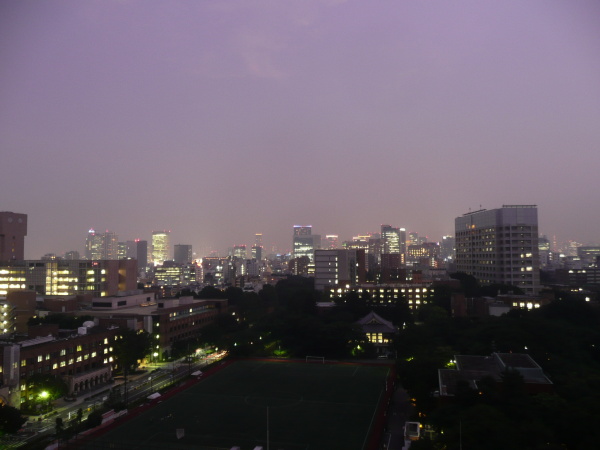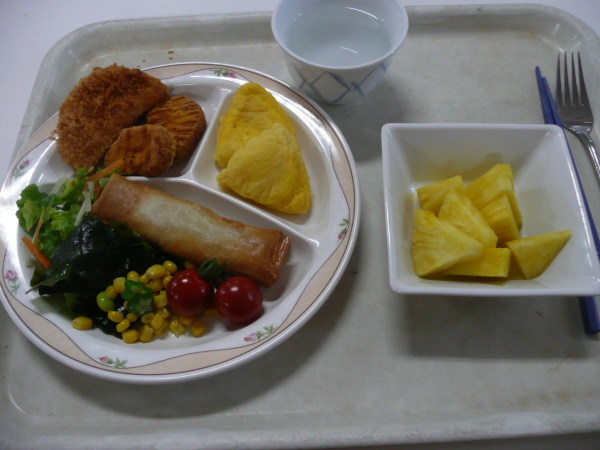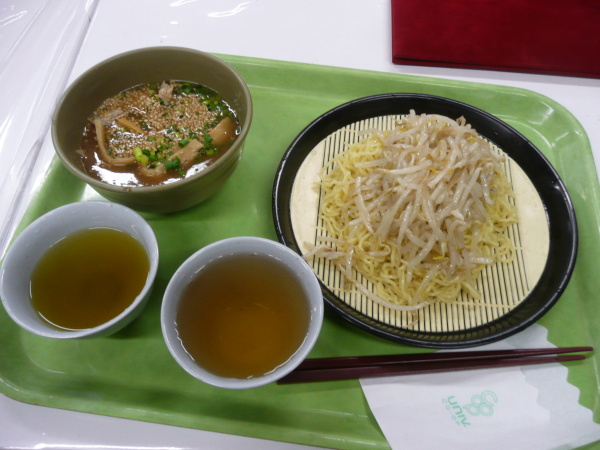I guess this post won't be very interesting for most of my regular readers, but if a future UTRIP kid stumbles over it, it might give him/her an idea of how it works... in my lab, and potentially other labs.
My building:
Opposite building:
As for working hours, mine are pretty relaxed and I certainly don't work like your average Japanese salaryman. Even other people, who don't have the magical "visiting foreign researcher" status, don't seem to be adepts for karoshi (death from overworking yourself). Basically, most of us start at 10 a.m. (sometimes some people at 9 or so) and I finish before the lectures start (16:10 - 20 minutes for getting to Science Building 1, since I'm in no. 2). Some people, however, go back to lab and work in the evenings/night too (occasionally even until 10 p.m. O___o). But most of us really have fairly easy schedules. After the lecture weeks ended, I stayed until 5 - 7 p.m., which is not bad.
My last night in Tokyo, at the campus:
I'm basically spread over several rooms - in one, I got a super nice desk with drawers and a LAN cable (at my home lab, undegrads (well, I'm already a grad since June) don't have their own desks). In another room, I have another desk just for myself (I feel guilty since it's the only one with a window and also the most spacious one - I don't think I deserve such nice treatment considering how useless I am most of the time), where I have my own set of pipettes, tips, eppendorfs etc. And there's another room for cultivating bacteria, photographing gels etc. and one more for PCR. It's not easy to remember where everything is, lol. At least I already remember where are the cleaner toilets (thanks to the M1 student who's been kinda taking care of me).
Lunches at the cafeterias:
Caf 2
Caf 1
My labmates are obsessed with エアコン (air conditioner). It's set to about -5°C, so the office and all the labs are super chilly. I always rejoice when I can go out in the hall or outside the building, where there are normal temperatures. So I suggest you bring a cardi/scarf to school because apparently the rumours about Japanese people not sweating and being used to hot and humid weather are false - they all complain about how hot and sweaty it is and they completely depend on the damned machine. Once I managed to get them to set it for 29°C when I seemed to die from cold, but since I've been apparently healthy since then, no more concessions for my sake.
The lake
In general, I'm using techniques I've already done before (for 3 years). But the machines, protocols and opinions are kinda different, so for the first time, I basically needed my sub-supervisor to baby-sit me, or rather he felt he had to do it, which was probably smart, because during the first week whatever I tried to do by myself, I messed up. Oh, BTW, make sure if your supervisor says "fifteen" or "fifty". Makes a big difference. The second week, I already did a couple of things completely by myself (after receiving the protocols).
Hongo campus in general
Week 1: I managed to find my building
Week 2: I managed to find my lab, toilets, one of the cafeterias and Science Building 1
Week 3: I managed to find all of the chemicals I've been using
Week 4: I managed to find all the stores on the campus and the lake
Week 5: I managed to walk form the hotel to uni and back on foot
Week 6: Hongo campus, you're my new home!
Hello Kitty snacks - I ate my way through 30 HK stickers to the 40 Years anniversary plate <3
I was really lucky that my research project was very well suited for 6 weeks. I obtained most of my results a week before the final presentation and I started writing my research report (looks pretty much the same as your average scientific article) already during my fourth week, so I was pretty much finished before I even returned to Prague. As for my presentation, I had lots of difficult animations for my methods and intoduction, but it took me about one full day of work. Some people spent around 72 hours non-stop working on it.
Working hard, looking smart :)
In general - also maybe because I was one of the older participants - I wasn't controlled very much. For both my presentation and my report, I was told to do it however I wish. I got some suggestions for my report after one of the lab senpai read it, but the main concept was completely left for me to decide. The same went for discussion and result interpretation - naturally, the professor looked at the results, helped me interpret them etc., but it was up to me to find material to write proper discussion. And during the second half of my stay, I did all the techniques I was familiar with completely by myself, and only had to cooperate on those that were new to me. In general, I wouldn't say that we were young genius level researchers, but it felt very similar to what grad students do in my lab - so basically, even as an undergrad, you're supposed to be independent on a grad-level.
Last dinner
Language wise, knowing Japanese helps tremendously. If you don't speak any yet, I strongly recommend you to start learning it intensively ASAP.
Money-wise, the scholarship (160 000 Yen) is enough for the plane ticket (if it is under 100 000 Yen) and the daily expenses (food around 40 000 if you cook at home and watch it a bit, some 15 000 for transportation and 5 000 for entry fees and such), if you don't shop (I did) and you walk on foot a lot and don't travel too much. But the point is, if you're a modest person, the scholarship is totally enough for you to participate, so you don't have to be a rich kid.
The hotel, located in Iidabashi, is very nice, with awesome kitchen and close to a couple of good places to get cheap food (Hanamasa, Maruetsu's evening sales...).
"Let's talk about biology" lunch:
Hongo campus is the most beautiful place ever, and it has everything you need too.
Also, being a Todai student is incredibly prestigious in Japan. If you tell people you study there, they will almost bow down to you. It's a place where high school students go on school trips and normal people come to photograph it. Graduating from Todai means becoming Japan's elite. Unlike here, no one thinks you're a spoiled brat whose parents got him/her there - people think you must be really smart and hardworking. Even UTRIP takes pride in being a prestigious program, with only under 7% of applicants being accepted. So, if you go on UTRIP, you will be treated really really well by everyone!
To sum it up - I am infinitely grateful for the opportunity to carry out a research project for professor Fukuda's laboratory at Todai, I learnt many new things, I made lots of amazing friends, I gained so much experience and had the time of my life - I feel really blessed to be able to share all of these emotions with my new Todai friends. Hope we will be able to meet again, sometime, someplace.
Vita



















































Ta budova školy je úžasná! Ale Tokio by se mi asi nelíbilo, moc moderních budov, to já nemám ráda. Jídlo vypadá skvěle :) Gratuluju ke zdárně dokončenému projektu!
ReplyDeleteDěkuju, mně se tam líbilo - je to takový mix starého a nového - a jídlo bylo super, docela se mi po něm tady v Paříži stýská.
Delete